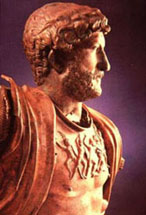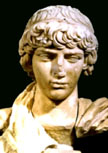|
|
 |
|
The Pantheon |
|
written
by zinnia / 09.04.2005 |
|
|
| |
Patron |
| |
| |

|
| http://www.the-colosseum.net/ita/
history/imperatores.htm |
| Emperor Hadrian |
| Third of the Five Good Emperors, Hadrian was most notable for putting end to the Roman Empire's expansion and his admiration for Greek civilization. |
| |
|
| |

|
| http://ladyhedgehog.hedgie.com/
antinous.html |
| Beloved Antinous |
| involved in a forbidden relationship with Hadrian, Antinous was a Greek youth from Bithynia. After his mysterious death, Hadrian diefied him as the last god of antiquity. Many statues of the Greek boy survived up to this day. Hadrian never recovered from the loss of Antinous, he died 8 years later in 138 C.E. |
| |
|
Of Hadrian’s many accomplishments during his reign, the most notable were his conclusion of the Roman Empire’s expansion, and his avid fascination for Greek civilization that earned him the name “Greekling”. Caesar Traianus Hadrianus Augustus (76 - 138 C.E.) – he bared the name Publius Aelius Hadrianus before coming to throne – known to us as Emperor Hadrian, was the third of the Five Good Emperors. In Italica, Hispania, 76 C.E., Hadrian was born the son of Publius Hadrianus Afer. When his father passed away in 85 C.E., Hadrian was entrusted to Trajan and Acilius Attianus. Despite the lack of military conflict during his rule, Hadrian nonetheless gained plenty of military experience in his early years. In 95 C.E. Hadrian became the tribune of Legion II Adjutrix, located in Upper Moesia on the Danube River. Afterwards he was transferred to Legion I Minervia of Lower Moesia (present day Germany). In 98 C.E., with the death of Nerva, Trajan succeeded as emperor and Hadrian’s career began to advance. Because of his success in the Dacian wars, Hadrian was appointed quaestor (101 C.E.), praetor(106 C.E.), and consul(108 C.E.). In the ten years prior to his enthronement, Hadrian was more or less politically inactive, during which he became an archon in Athens (112), perhaps to devote his attention to the Greek culture that he was so fond of.
After coming to power, Hadrian quickly abandoned Trajan’s conquests in Armenia and Mesopotamia. Despite frequent resistances from high government officials, Hadrian decidedly concluded the expansion of the Roman Empire. He believed that further broadening of the empire was unnecessary, and it would be implausible to defend such a vast frontier. Hadrian strengthened the empire’s existing borders by erecting artificial fortifications along boundaries that lacked natural ones; among which the most famous is Hadrian’s Wall in Britain. His strive towards peace is also evident through his effort in reconciliation with Parthia when they were on the brink of war.
With his hair curled on a comb and wearing a full beard, Hadrian was extremely fond of Hellenistic culture. He typified Hellenistic culture on the Romans. Hadrian was the first Roman emperor to wear a full beard and moustache. While men of Greek almost always wore beards, the Romans were most commonly clean shaven. This attribute most definitely demonstrates his ardor for Greece. Moreover, the several construction projects in Greece reflect Hadrian’s admiration for the Greeks. In regards to his personal life, Hadrian is widely known for his relationship with the Greek youth Antinous. Antinous was born in Bithynia and met Hadrian in his teens. In 130 C.E., Antinous mysteriously drowned in Nile while they were touring Egypt. His sudden death left Hadrian stricken with grief. In memory of Antinous, Hadrian founded the Egyptian city Antinopolis and made him the last new god of antiquity.
|
| |
|
| |
|
|
 |
|


